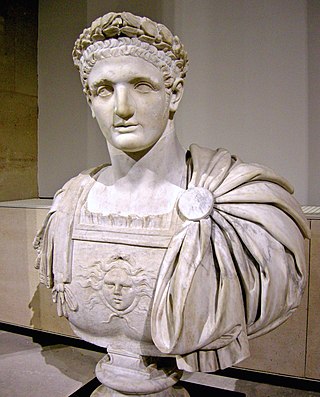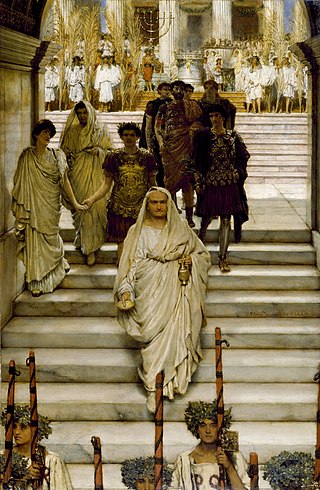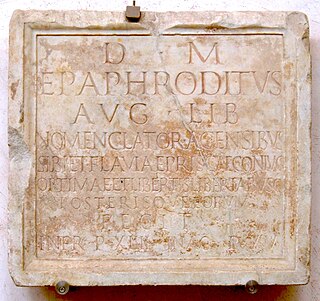
The 90s was a decade that ran from January 1, AD 90, to December 31, AD 99.

Lucius Annaeus Seneca the Younger, usually known mononymously as Seneca, was a Stoic philosopher of Ancient Rome, a statesman, dramatist, and, in one work, satirist, from the post-Augustan age of Latin literature.
Gaius Musonius Rufus was a Roman Stoic philosopher of the 1st century AD. He taught philosophy in Rome during the reign of Nero and so was sent into exile in 65 AD, returning to Rome only under Galba. He was allowed to stay in Rome when Vespasian banished all other philosophers from the city in 71 AD although he was eventually banished anyway, returning only after Vespasian's death. A collection of extracts from his lectures still survives. He is also remembered for being the teacher of Epictetus and Dio Chrysostom.

Publius Clodius Thrasea Paetus, Roman senator, who lived in the 1st century AD. Notable for his principled opposition to the emperor Nero and his interest in Stoicism, he was the husband of Arria, who was the daughter of A. Caecina Paetus and the elder Arria, father-in-law of Helvidius Priscus, and a friend and relative by marriage of the poet Persius. Thrasea was the most prominent member of the political faction known today as the Stoic Opposition.
Demetrius, a Cynic philosopher from Corinth, who lived in Rome during the reigns of Caligula, Nero and Vespasian.
Helvidius Priscus, Stoic philosopher and statesman, lived during the reigns of Nero, Galba, Otho, Vitellius and Vespasian.
When Vespasian sent for Helvidius Priscus and commanded him not to go into the senate, he replied, "It is in your power not to allow me to be a member of the senate, but so long as I am, I must go in." "Well, go in then," says the emperor, "but say nothing." "Do not ask my opinion, and I will be silent." "But I must ask your opinion." "And I must say what I think right." "But if you do, I shall put you to death." "When then did I tell you that I am immortal? You will do your part, and I will do mine: it is your part to kill; it is mine to die, but not in fear: yours to banish me; mine to depart without sorrow." Epictetus, Discourses, 1.2.19–21

The Flavian dynasty ruled the Roman Empire between AD 69 and 96, encompassing the reigns of Vespasian (69–79), and his two sons Titus (79–81) and Domitian (81–96). The Flavians rose to power during the civil war of 69, known as the Year of the Four Emperors. After Galba and Otho died in quick succession, Vitellius became emperor in mid 69. His claim to the throne was quickly challenged by legions stationed in the Eastern provinces, who declared their commander Vespasian emperor in his place. The Second Battle of Bedriacum tilted the balance decisively in favour of the Flavian forces, who entered Rome on 20 December. The following day, the Roman Senate officially declared Vespasian emperor of the Roman Empire, thus commencing the Flavian dynasty. Although the dynasty proved to be short-lived, several significant historic, economic and military events took place during their reign.

Tiberius Claudius Epaphroditus or Epaphroditos, was a freedman and secretary of the Roman Emperor Nero. He was later executed by Domitian for failing to prevent Nero's suicide.
Rubellius Plautus was a Roman noble and a political rival of Emperor Nero. Through his mother Julia, he was a relative of the Julio-Claudian dynasty. He was the grandson of Drusus, and the great-grandson of Tiberius and his brother Drusus. Through his great-grandmothers Vipsania Agrippina and Antonia Minor, he was also descended from Marcus Vipsanius Agrippa and Mark Antony. He was descended from Augustus' sister Octavia Minor, herself a grand-niece of Julius Caesar.

The conspiracy of Gaius Calpurnius Piso in AD 65 was a major turning point in the reign of the Roman emperor Nero. The plot reflected the growing discontent among the ruling class of the Roman state with Nero's increasingly despotic leadership, and as a result is a significant event on the road toward his eventual suicide and the chaos of the Year of the Four Emperors which followed.

Ancient Roman philosophy is philosophy as it was practiced in the Roman Republic and Roman empire. Roman philosophy includes not only philosophy written in Latin, but also philosophy written in Greek in the late Republic and Roman empire. Important early Latin-language writers include Lucretius, Cicero, and Seneca the Younger. Greek was a popular language for writing about philosophy, so much so that the Roman Emperor Marcus Aurelius chose to write his Meditations in Greek.
The Light Bearer is a 1994 historical novel by Donna Gillespie set in first century Rome, during the reigns of the Emperors Nero and Domitian. The novel centers upon three historical events: the Emperor Domitian’s war with the Germanic Chattian tribe in 83 A.D.; the inauguration of the Colosseum, or Amphitheatrum Flavium; and the assassination of Domitian. In dramatizing the assassination, the author follows the details given by first-century Roman historian Suetonius.

The Roman Actor is a Caroline era stage play, a tragedy written by Philip Massinger. It was first performed in 1626, and first published in 1629. A number of critics have agreed with its author, and judged it one of Massinger's best plays.
Fannia was a woman of ancient Rome, notable as the granddaughter of Arria Major.
Quintus Junius Arulenus Rusticus was a Roman Senator and a friend and follower of Thrasea Paetus, and like him an ardent admirer of Stoic philosophy. Arulenus Rusticus attained a suffect consulship in the nundinium of September to December 92 with Gaius Julius Silanus as his colleague. He was one of a group of Stoics who opposed the perceived tyranny and autocratic tendencies of certain emperors, known today as the Stoic Opposition.
Paconius Agrippinus was a Stoic philosopher of the 1st century. His father was put to death by the Roman emperor Tiberius on a charge of treason. Agrippinus himself was accused at the same time as Thrasea, around 67 AD, and was banished from Italy. As a philosopher he was spoken of with praise by Epictetus.
Titus Clodius Eprius Marcellus was a Roman senator, twice consul, best known for his prosecution of the Stoic senator Thrasea Paetus and his bitter quarrel with Helvidius Priscus. Eprius was also notorious for his ability to ingratiate himself with the reigning Emperors – especially Nero and Vespasian – and his hostility to any senatorial opposition, but in the last year of Vespasian, in circumstances that remain obscure, he was accused of treason and committed suicide.
Herennius Senecio was among the Stoic Opposition to the emperor Domitian, under whose rule he was executed. He was from Baetica in Roman Spain. He was the author of a laudatory biography of the Stoic martyr Helvidius Priscus.
The gens Helvidia was a plebeian family at Rome. Members of this gens are first mentioned in the final decades of the Republic. A century later, the Helvidii distinguished themselves by what has been called their "earnest, but fruitless, patriotism."
The gens Rubellia was a minor plebeian family at ancient Rome. Members of this gens are first mentioned in the time of Augustus, and they achieved prominence during the first century, when two of them obtained the consulship: Gaius Rubellius Blandus in AD 18, and Lucius Rubellius Geminus in AD 29.








